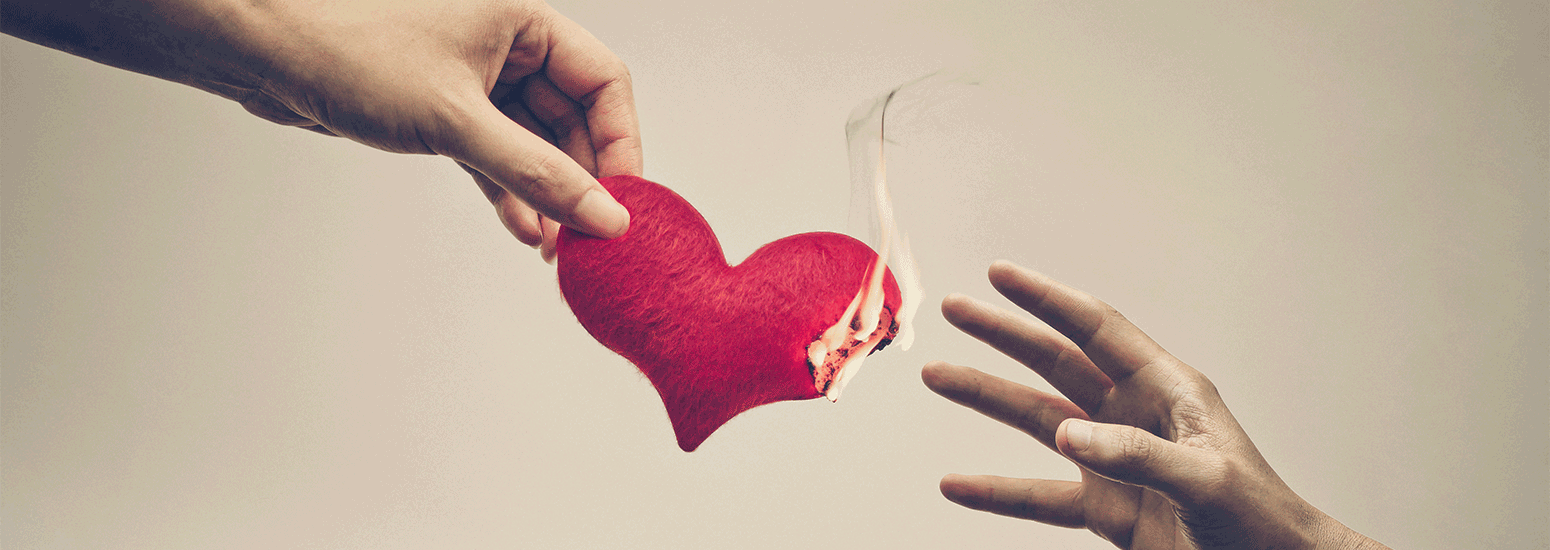The words “I’m addicted to you” are a warning sign that there is something dark in your relationship. Although this may sound romantic, it might be an indication that you are in an addictive relationship.
If you grew up in a dysfunctional family, then you may not recognize what a healthy relationship should look like and feel like. However, that doesn’t mean that you can’t find happiness in your relationships. By attending a love addiction intensive retreat and learning more about your childhood wounds, you can transform your relationships and create healthy and meaningful bonds in your life.
Why Do People Choose Toxic Relationships?

Very often, issues in your adult relationships relate to your childhood because you’re drawn to what’s familiar, not what is good for you.
If you haven’t taken time to heal your childhood wounds, then you are likely to be susceptible to addictive relationships. Especially, if you have experienced any of the following:
- Alcoholic parent(s)
- Losing a sibling or parent at a young age
- Finding out that you are adopted
- Some kind of abuse
- Emotionally unavailable parent(s)
- Some sort of neglect
- Fear of being abandoned
- Not receiving validation from your parent(s)
Unhealthy childhood relationship patterns that are unresolved often lead to unbalanced, unfulfilled and addictive relationships. And addictive relationships become a survival pattern. They happen because you are trying to heal the childhood abandonment wound.
Is Love Addiction A Real Thing?
Love addiction, otherwise known as pathological love, is very real and affects a great number of individuals worldwide. It involves a pervasive and obsessive interest in one or several romantic partners.
Love addicts renounce control as well as other behaviors and interests to be with their chosen partner at all costs. They are prone to novelty seeking and impulsivity which tend to stem from childhood attachment wounds.
At PIVOT, we call love addiction attachment dysregulation because many find this term shaming. Love itself isn’t addictive however many individuals who grew up craving love, are addicted to the craving of something they have not experiences. Therefore when they feel a honeymoon connection with someone, they mistake it for love and become hooked and crave more and more.
Can You Be Addicted to Someone You Love?
Some individuals have a tendency to become addicted to “love”. But what does this actually mean? Where do you draw the line between what people call love addiction and simply being in love with another person?
Well, for most attachment challenged individuals, their relationship becomes the center of their universe, taking over their entire being. And when an anxious person who is called a love addict ends up with an avoidant or ambivalent partner, these behaviors can become even more pervasive, drawing the love addict into a toxic, vicious relational circle.
What Is An Addictive Relationship?
Just like an addiction to alcohol, drugs or other substances, being in an addictive relationship is unhealthy, toxic and powerful. And it brings you pain usually with a love/hate dynamic.
Addictive relationships are colored with conflicts, emotional abuse, and even physical violence.
Although you may be aware of how dysfunctional the relationship is, you stay in it. This is the definition of an addictive relationship. Now if you’ve dated one horrible person, this doesn’t mean you’re addicted to bad relationships. However, if you’re noticing a pattern, then there may be a problem.
Why Is A Toxic Relationship Addictive?
Unfortunately, many love addicts are attracted to emotionally unavailable partners. This tends to happen because the love addict’s parents or caregivers were unavailable or abusive.
Simply put, the love addict is subconsciously attracted to what is familiar to them, recreating the toxic cycle they experienced in their childhood. They are used to being abandoned and they end up begging for affection and love. Therefore they seek to find the same dynamic in their adult relationships.
Can An Addictive Relationship Become Healthy?
An addictive relationship can’t be saved unless you recognize and heal your relational wounds. If you are in an unhealthy relationship, you will first need to identify your own feelings and be honest with yourself and your partner about both the negative and positive aspects of the relationship.
In many cases, leaving the addictive relationship is the best course of action. If you feel isolated and lonely, know that you’re not alone. Unhealthy relationship patterns are more common than you may think and relationship addiction recovery is entirely possible.
The good news is that you don’t have to be in an addictive relationship for life. You are not “broken.” Just because you come from a dysfunctional family doesn’t mean you can’t create secure attachments and healthy relationships.
It is time to shift. If you are committed to change, then you’re not stuck with this forever. You can have relational freedom.
 How Do I Get Out Of An Addictive Relationship?
How Do I Get Out Of An Addictive Relationship?
The only way to get out of an addictive relationship is to change what you are willing to put up with and to make lasting changes. Here’s what you should do:
Step 1
Start by recognizing the addiction. Be present and accept what you are feeling, thinking and what you want.
This is the hardest step for most people. It is especially difficult to be present when your present moment is hostile, hurtful, scary and invalidating. Many people stay locked in an addictive relationship by pretending that this present negative moment isn’t happening.
If you’ve ever said to yourself:
- “Oh, he/she didn’t mean it”,
- “He’s/She’s not always so mean”,
- “He/She can’t help it”,
- “If I just do this, then he’ll/she’ll be nice again.”
Then you are pretending and you are not in the present moment.
Step 2
Stop judging your feelings, thoughts, and wants. Be aware of them and accept them. Once you accept your feelings, thoughts, and desires, then you can decide what to do about them.
Step 3
Remember you are worthy of love. And the most powerful love comes from within you. Don’t depend on your partner for love. Instead, increase your love for yourself. Love your uniqueness, your views, your personality, and your gifts.
Step 4
Identify ways you would like to express the best in yourself and take actions that reflect your best self. You deserve to be treated with respect. Don’t allow yourself to be treated any less than your best self deserves.
Step 5
Be willing to change. Real change starts with healing and repairing yourself. This step includes dealing with feelings, grieving and healing from past wounds. Healing allows you to reconnect to yourself with self-compassion and self-love. This is best done with the help of a professional who specializes in addictive relationships.
Step 6
Make these changes, work on self-love and healing yourself without trying to change or judge anyone else. This process is about your recovery. You can’t change anyone else except yourself.
Step 7
Once you have started to heal yourself, then you can make choices. You can choose to give up the unhealthy relationship. You can decide that being whole, unique and your true self is worth it. You can determine whether your relationship is working well or if you are just addicted. You have choices.
Find Freedom At Our Love Addiction Intensive Workshop
The best way to achieve relational freedom is to seek assistance from experienced professionals and talk about the relationship and the pain that’s inside of you. Attending a love addiction retreat will help you to better understand yourself and learn to nurture relationships based on emotional support and mutual respect.

Remember you are worthy of happiness and love, and a healthy relationship. You can have relational freedom. If you wish to learn how to create meaningful connections and overcome addictive relationships, then contact PIVOT.
We’re here to help you by providing insightful individual relationship coaching as well as in-depth intensive workshops for overcoming relationship challenges. Contact us today and start your journey towards relational freedom!



